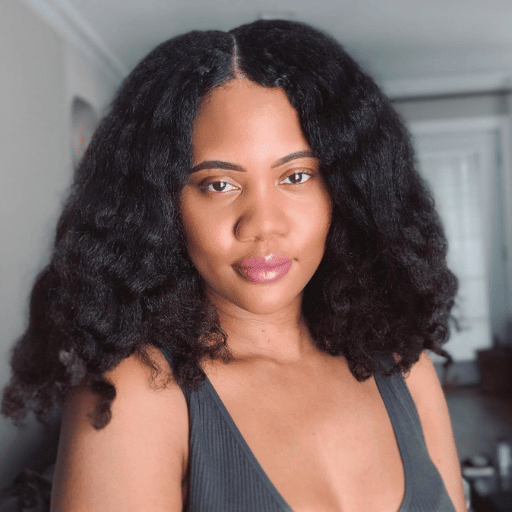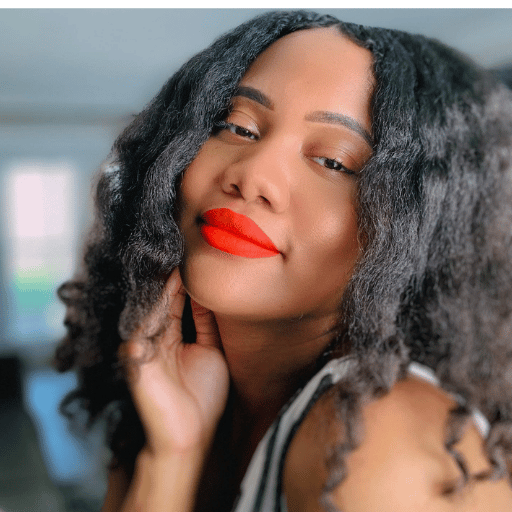“How often should I use conditioner?” is a question that may seem like a no brainer, when actually you’d be surprised how many people either don’t do it enough or end up over conditioning their hair way too often. Conditioner is often the staple in a hair regimen to help revitalize the hair after using a shampoo. But how often should you actually use conditioner? It depends on a few factors! Find out more in this blog post!
How Often Should I Use Conditioner?
If your are shampooing your hair, the rule of thumb for a healthy mane is to condition after every wash. Whether that is once per week or every other week, you will almost always want to follow up with a conditioner of choice after cleansing your hair.
A shampoo’s main purpose is to wash away any impurities, dirt and excess oil that tend to build up on the hair strands throughout the week. When cleansing your hair with a shampoo, the cuticle layer of the hair strand becomes gently raised.
This this due to the negative charge of the hair coming into contact with the negative charge of a shampoo. When the two charges meet, the reaction raises the cuticles on the hair strand.
The purpose of conditioner is to smooth the cuticle layer back down and this happens due to the positive charge of a conditioner. Because the charge on a conditioner is positive, the hair gently lays flat again on the hair strand and you will notice it become easier to detangle your hair as a result.
When you condition your hair after every wash, you are insuring that the cuticle layer is laying flat, helping to protect the inner most later of the hair, the medulla.
Although there are different types of conditioners to choose from such as a basic rinse out conditioner, a deep conditioner or a leave in conditioner, you will want to incorporate either of the first two options (basic conditioner or deep conditioner) every time, before going in with your leave in conditioner prior to styling. (Using a leave in conditioner is optional).
It is not recommend to go from shampoo straight to then using a leave in conditioner, because it will not moisturize and hydrate the hair at the same level that a rinse out or deep conditioning treatment would.
Is it ok to condition your hair everyday?
Conditioning your hair everyday is not recommended. The goal of using a conditioner is to add moisture and replenish the hair with specific vitamins and nutrients that the hair strand may be lacking.
Anytime you condition your hair, your hair is taking in some moisture and/or proteins to help with dryness and breakage. However, over conditioning your hair by doing this every single day, will eventually cause the hair to swell.
Hair that swells too often can be a cause for concern as too much moisture means that your hair could potentially weaken and break off due to moisture overload.
The hair will start to feel mushy and have trouble maintaining a curl or any style for that matter that you try to put in place. This also holds true for using a co wash aka a cleansing conditioner daily.
If you have an active lifestyle that requires you to cleanse your hair more often than once per week, try to opt for a dry shampoo instead to keep things smelling and looking fresh.
Can over conditioning cause hair loss?
Yes, over conditioning can cause hair loss over time. The hair strand is a fiber that is primarily made up of protein and conditioner has the ability to add moisture, helping to repair weak, dry, brittle hair (if the damage is not too extensive).
However, too much of anything can be a bad thing. If you are someone who likes to leave their conditioner in for hours and sometimes even days at a time, you might run the risk of over conditioning your hair.
The likelihood of your hair absorbing anymore vitamins and minerals from your deep conditioner after 20mins (with steam or indirect heat), is slim to none. So if the product is sitting on your hair longer than that, you will come into contact with a case of hygral fatigue.
Hygral fatigue is the repeated pattern of the hair strand swelling and un swelling. If you continue to allow a conditioner (whether it’s a basic conditioner or a deep conditioner) to sit on the hair past the recommended time on its label of directions, the risk of too much moisture getting into the hair is very likely.
Once this happens, your hair will eventually snap off very easily and lose its curl definition over time. If you are not careful , adding a heat styling tool on top of this condition once it occurs can lead to extensive breakage and hair loss overtime.
What is the proper way to use conditioner?
With so many different conditioners to choose from on the market, it can be a little confusing on how to use each one and when. Lets go through the different types and learn how to properly incorporate them into a hair care regimen.
Rinse Out Conditioner
A rinse out conditioner is meant to be used right after your shampoo that is, only if you do not plan on deep conditioning. A rinse out conditioner is meant to coat the hair and smooth the cuticle layer.
This helps the hair to glide past each other when using a detangling comb or brush, reducing and often helping to eliminate tangles, frizz and breakage. A rinse out conditioner however, has larger molecules at a microscopic level that don’t do the best job at penetrating the hair strand for a longer lasting level of moisture and strengthen properties. This is because it is only meant to coat the hair strands.
Try leaving your rinse out conditioner on you hair for no more than 5-6 minutes during a session UNLESS the directions suggest otherwise. For added nutrients to the hair for growth and length retention, opt for using a deep conditioner instead with indirect heat or steam.
A conditioner that comes highly recommended for a quick boost of added moisture and slip, is the Mielle Organics Mongongo Oil Hydrating Conditioner!
Not only is this conditioner protein free, but it packs a solid punch in the moisture department as it so effortlessly MELTS into the hair strands!
The shine it provides after rinsing it out is literally out of this world and this conditioner is unique in that the directions suggest leaving it on the hair for 15minutes before rinsing it out! Thia makes it the perfect 2 in 1 combo if you just need a quick conditioner to use as a hair mask by leaving it in for 15min.
A little goes an insanely long way with this product because it is super concentrated in its formulation.
Deep Conditioner
The job of a deep conditioner is to replenish the hair of moisture and protein loss, but at a much deeper level when compared to a traditional rinse out conditioner.
A deep conditioner, unlike a regular conditioner, is made up of smaller molecules which are designed to actually penetrate through the cuticle layer of the hair strand instead of just simply coating it for slip.
When used in addition with indirect heat or steam and a processing cap, you will notice the pores on your hair strand open and take in the deep conditioner with little to no issue.
If you decide to shampoo, immediately use a rinse out conditioner AND deep condition after that, your deep conditioner will have little to no effect as the rinse out conditioner has already coated your hair, making it much harder for a deep conditioner to seep in thereafter.
Deep conditioners are often left on the hair with the addition of heat, for 20 minutes. Our favorite pick for a deep conditioner that hydrates and strengthens the hair, is the Camille Rose Natural Algae Renew Deep Conditioning Mask.
This hair mask literally has the hair feeling as soft as butter! It is easy to apply, super thick and has great slip. If you are really looking to treat your hair with a product that is enriched with luxurious butters and oils that help to protect and retain your length, you will definitely want to give this deep conditioner a try!
Leave In Conditioner
Leave In conditioner is essential for using as a base layer before going in with your styler. They can help to prolong the amount of moisture the hair holds onto once applied and sealed in with a styling cream, styling gel or hair oil.
Once you have rinsed out either your rinse out conditioner or deep conditioner, if you feel like it will be a week or more before rewashing and styling your hair again, apply a dollop or spritz of leave in conditioner all over your hair from root to tip.
This will help to keep the cuticle layer of the hair flat, making it appear shinier and add some extra slip for combing and brushing while damp. The point of a leave in conditioner is to “leave it in”, so don’t go rinsing it away until its time for your next shampoo session.
Our top pick for a leave in conditioner that not only hydrates the hair but also adds great slip and aides in length retention, is the Curls Blue Berry Bliss Reparative Leave In Conditioner.
This leave in conditioner contains blueberry extract that has significant antioxidant properties to help protect the hair, as well as mango butter and coconut oil for hair that is impressively easy to work with.
Can I skip shampoo and just use conditioner?
If you live a very active lifestyle that makes you produce a lot of sweat and you want something that is not as harsh as a cleansing shampoo, but not quiet a full on conditioner either, you might want to reach for a co wash.
A co wash is a cleansing conditioner, made up of conditioner and very mild cleansing surfactants. Co washes are not meant to thoroughly cleanse the hair of all sweat, dirt and products. They act as more of a bridge between the full on process of wash day and simply refreshing your hair.
Co washes are great to incorporate in the warmer months, especially if you are doing wash and go’s daily. However, always use a clarifying shampoo at least every other week in between co washing, to ensure that you are properly and thoroughly cleaning your hair and scalp.
Final Thoughts On “How Often Should I Use Conditioner?”
Using conditioner in your hair care routine is a great step when it comes to smoothing the cuticle layer of the hair strands, packing in the moisture, creating slip for easier detangling and reducing frizz.
Ideally, conditioner should be used after every shampoo session that you do. Whether you choose to use a basic rinse out conditioner or a deep conditioning treatment to add specific vitamins, minerals and moisture properties, will be up to you depending on how much time you have that day.
Make it part of your regimen and be sure not to leave it in for more than the recommended time on the label for optimal results.
More In Conditioning:
Can You Leave Conditioner In Your Hair (Without Damaging It)?










Recent Comments